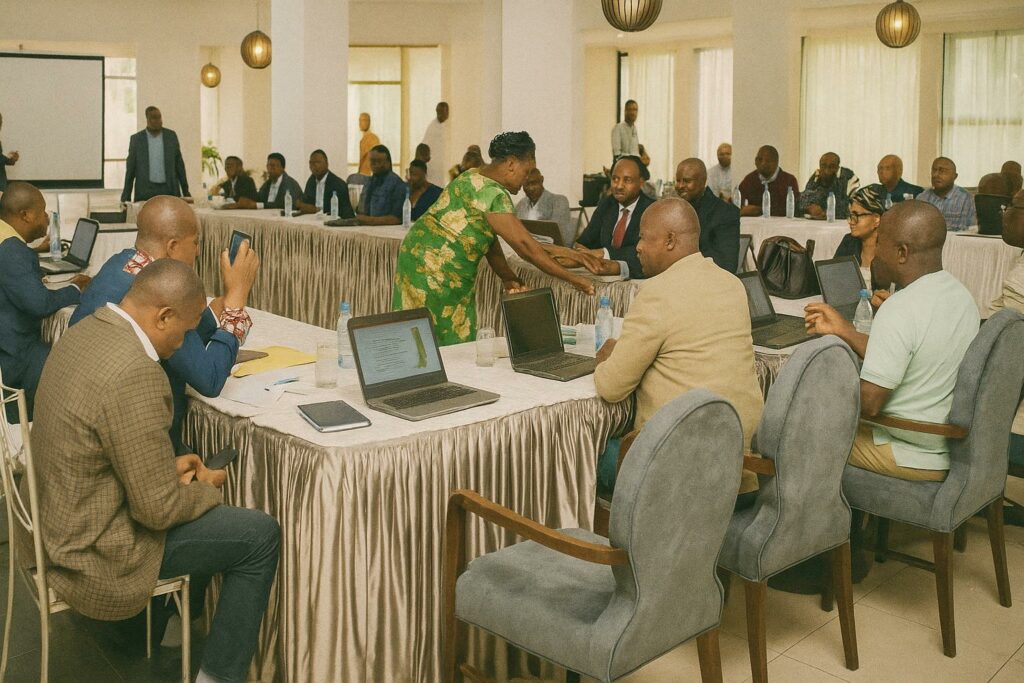A Conclave of Diverse Voices Revisits the 2020 Forest Code
For forty-eight intense hours in late June 2025, the marble corridors of the Hôtel Michaël in Brazzaville reverberated with careful technical prose rather than casual lobby talk. Convened by the Rencontre pour la Paix et les Droits de l’Homme and the Observatoire Congolais des Droits de l’Homme, the National Multi-Stakeholder Forum on Forest and Climate Initiatives assembled senior officials from the ministries of Forest Economy and Environment, concessionaires hauling Congolese timber to global markets, and the often unheard representatives of local and Indigenous communities. The declared purpose—“reinforcing synergies for an inclusive governance of forests and climate”—echoes the spirit of the 2020 Forest Code adopted under President Denis Sassou Nguesso’s administration, a statute widely regarded by regional observers as one of Central Africa’s most detailed legal blueprints for sustainable forestry (FAO Country Profile 2024).
Timber Revenues and Climate Aspirations Seek a Delicate Equilibrium
The Republic of Congo’s forest estate covers roughly 65 percent of national territory, generates nearly six percent of GDP and acts as a vital carbon sink within the Congo Basin, the planet’s second-largest tropical forest massif (World Bank Data 2023). Government delegates at the forum underscored that Brazzaville’s endorsement of the Paris Agreement, its Letters of Intent with the Central African Forest Initiative and its voluntary partnership with the European Union on FLEGT legality verification place the country under both economic and diplomatic spotlights. Striking the right balance, several speakers noted, is less a binary choice than a sophisticated choreography requiring regulatory certainty, credible monitoring and predictable revenue flows for rural populations.
Civil Society Calls for Deeper Embedding in Decision-Making
Christian Mounzéo, who facilitated most plenary exchanges, argued that forests in Congo are “not merely a resource, they are a fundamental right—a cultural archive for our peoples.” His assessment was echoed by Nina Cynthia Kiyindou Yombo of the O.C.D.H., who reminded participants that the 2022 law on Indigenous Peoples’ Rights will prove transformative only if implementing decrees arrive without delay. Voices from Sangha and Likouala provinces recounted instances where logging roads improved market access yet where benefit-sharing committees remained embryonic. Such testimony, delivered with respect rather than recrimination, reinforced the proposition that legitimacy in forest governance now depends on demonstrable community consent.
State Commitments: From Legal Texts to Tangible Decrees
Responding to the civil society concerns, senior officials from the Ministry of Forest Economy announced that draft decrees on consent procedures, REDD+ safeguards and compensation schedules have already cleared inter-ministerial review. One delegate hinted that a consolidated package could reach the Council of Ministers before the next UNFCCC COP. Observers welcomed the timeline, noting that the existing Forest Code already mandates local recruitment quotas for concessionaires and prescribes environmental audits; what remains is the rapid publication of the accompanying regulatory corpus to grant investors and communities alike the legal predictability they repeatedly request.
Private Sector Navigates Rising Expectations and Market Due Diligence
Industry representatives, including several FSC-certified operators, stressed that accelerated approval of management plans will allow them to comply with forthcoming European Union Deforestation-Free Regulation standards. They also pointed to recent tax incentives introduced by the Ministry of Economy to encourage local processing of hardwoods such as sapelli and okoumé. While acknowledging isolated lapses—often the result of subcontractors—they reiterated that a compliance-first business model increasingly defines access to premium markets in Paris, Hamburg and Shanghai.
Financing the Climate-Forest Nexus: The CAFI and FGMC Channels
Beyond legal instruments, the forum scrutinised resource flows. The United Kingdom’s Foreign, Commonwealth and Development Office, through its Forest Governance, Markets and Climate programme, confirmed an additional tranche of technical assistance focused on digital transparency tools, including the national legality verification system. Meanwhile, negotiators signalled progress on a results-based payment dossier with the CAFI Trust Fund, a mechanism that could unlock up to USD 25 million before 2027. Civil society urged that a meaningful share of those resources pass through local structures rather than remain confined to central budget lines, an appeal officials said would be examined during the upcoming mid-term review of the national REDD+ strategy.
Dialogue as a Constant Variable in Congo’s Forest Equation
As the final communiqué circulated, participants agreed that the workshop’s value stemmed less from the novelty of its recommendations than from its ability to preserve an atmosphere of mutual accountability. By foregrounding the Forest Code as a common reference, the forum translated potential friction into a shared search for practical remedies. For diplomats monitoring Central Africa’s stability metrics, such iterative, participatory policy-making offers a potent indicator of institutional maturity. As Congo-Brazzaville prepares its next Voluntary National Review on the Sustainable Development Goals, the seeds planted in the air-conditioned halls of the Hôtel Michaël may yet germinate into a governance canopy as resilient as the centuries-old sapelli species to which the conference’s more poetic delegates so often alluded.

